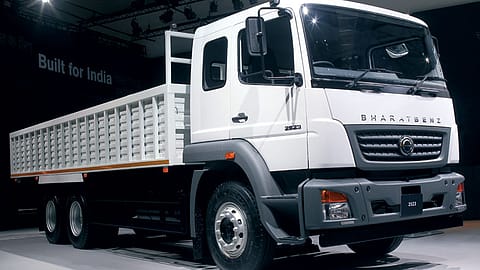Hot on its wheels
Daimler is preparing the ground to challenge tata motors, the market leader in trucks.

Ask Daimler India’s product engineers where they were employed before and the answer is almost always the same: Tata Motors. Daimler, one of the world’s biggest commercial vehicle makers, has been looking to upset Tata Motors’ numero uno position in the truck business, and this gives it an edge.
India is a market which Daimler attempted to tap earlier, but with little success. In 1954, it joined hands with Telco (now Tata Motors) to roll out trucks. Then came a partnership with Bajaj Tempo for light commercial vehicles in the early 1970s, and in 2004, there were talks of an alliance with the Hero Group, which eventually fell through. This time, Daimler decided to drive in alone. In 2008, it set up Daimler India Commercial Vehicles (DICV) as a wholly-owned subsidiary. Last year, Dieter Zetsche, chairman of the board of management of Daimler, flew to Chennai to announce BharatBenz—a brand created for Daimler’s trucks in India. Almost 85% of these trucks will be made with parts and suppliers from India.
In March this year, DICV flew down some 2,000 potential customers, dealers, financiers, and vendors to Hyderabad for a first look at its trucks in the 6-tonne to 49-tonne categories. The company plans to introduce one or two trucks every couple of months from the third quarter of this year until it reaches 17 models by 2014. Backing these products will be a Rs 4,400 crore, 400-acre plant in Chennai, 70 sales locations countrywide, and 35 dealerships that will scale up to 100 in two years.
Earlier, other players such as Mahindra Navistar Automotives (a venture between Mahindra & Mahindra and the U.S.-based auto major Navistar) had challenged Tata Motors, with no luck. According to the Society of Indian Automobile Manufacturers, Tata Motors’ current market share is around 60%, followed by M&M (16%) and Ashok Leyland (10.63%). But Daimler claims its products can best Tata’s in quality—at competitive prices. “German engineered is nice but that’s not enough. A truck has no business but to make money for you,” says Marc Llistosella, managing director and CEO, DICV.
Daimler promises longer service intervals for its trucks: 50,000 kilometre intervals for engine oil changes and 100,000 kilometre for gear oil changes. According to industry experts, the average interval for engine oil changes is around 20,000 kilometre, and 50,000 kilometre for gear oil changes. It also claims fuel efficiency that is at least 10% better than its rivals, and the cost of these vehicles is not expected to be much higher.
Wilfried Aulbur, managing partner for Roland Berger Strategy Consultants, a consultancy firm, and former MD and CEO of Mercedes-Benz India, says these are strong selling points but “the critical success factors for BharatBenz will be to ramp up its network of component suppliers and dealers and performance of the trucks.”
Tata Motors spokesperson Debasis Ray says the company’s strategy to hit back will be seen in the marketplace. Who doesn’t love it when heavyweights slug it out?